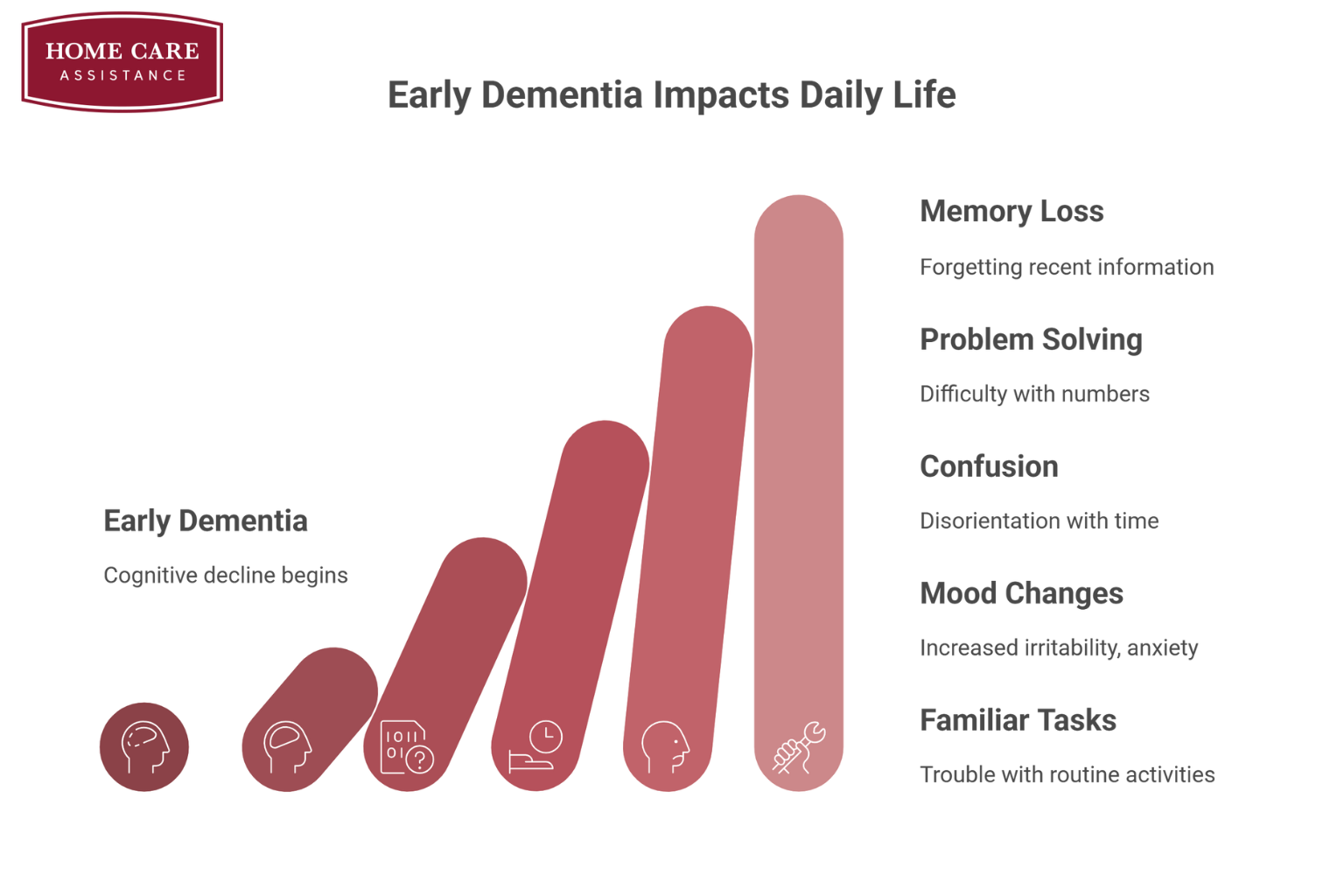Table of Content
Recognizing the early signs of dementia can make a significant difference in getting timely medical care and planning for the future. While occasional forgetfulness is normal as we age, certain changes in thinking, behavior, and daily functioning may indicate the onset of dementia.
Memory Loss that Disrupts Daily Life
One of the most common early signs of dementia is memory loss that goes beyond typical age-related forgetfulness. This type of memory loss interferes with daily activities and relationships.
Key indicators include:
- Forgetting recently learned information or important dates
- Repeatedly asking for the same information
- Relying heavily on memory aids or family members for tasks your loved one used to handle independently
- Forgetting conversations that happened just hours or days ago
- Difficulty remembering names of close friends or family members
Unlike normal aging, where someone might forget a name but remember it later, dementia-related memory loss typically doesn’t get better with time or prompting.
Dementia can also affect the ability to perform daily chores independently, and you may need to hire a dedicated caregiver to help your loved one manage these tasks. If your senior loved one has been diagnosed with a serious condition and needs help with tasks like meal prep, transportation, bathing, and grooming, reach out to Home Care Assistance, a leading provider of homecare services families can trust. We also offer comprehensive care for seniors with dementia, Alzheimer’s, and Parkinson’s.
Challenges in Problem-Solving and Planning
Early dementia often affects the ability to work with numbers, follow familiar recipes, or keep track of monthly bills. These cognitive changes can be subtle at first but gradually become more noticeable.
Warning signs include:
- Difficulty following a plan or working with numbers
- Trouble concentrating and taking much longer to complete familiar tasks
- Problems managing a budget or paying bills on time
- Difficulty following directions for cooking or assembling items
- Confusion about the steps needed to complete routine activities
These changes often become apparent when someone who previously managed complex tasks begins having difficulty with activities he or she has done for years.
Confusion about Time and Place
Disorientation regarding time, dates, seasons, and locations is another early indicator of dementia. This confusion typically worsens gradually and can create significant safety concerns.
Common manifestations include:
- Losing track of dates, seasons, or the passage of time
- Difficulty understanding something that isn’t happening immediately
- Getting lost in familiar places
- Confusion about whether events happened recently or years ago
Unlike temporary confusion that everyone experiences occasionally, dementia-related disorientation persists and often worsens over time.
There are a variety of age-related health conditions that can make it more challenging for seniors to live independently. However, many of the challenges they face can be easier to manage if their families opt for professional elder care. Montgomery families can rely on expertly trained caregivers to keep their loved ones safe and comfortable while aging in place.
Changes in Mood and Personality
Dementia can cause significant shifts in mood, personality, and behavior. These changes often occur before memory problems become severe and may be the first signs family members notice.
Behavioral changes may include:
- Becoming confused, suspicious, depressed, fearful, or anxious
- Increased irritability or agitation in certain situations
- Withdrawal from social activities and hobbies your loved one once enjoyed
- Changes in judgment or decision-making abilities
- Difficulty adapting to changes in routine or environment
These personality changes can be particularly distressing for family members and may affect relationships and social interactions.
Difficulty Completing Familiar Tasks
As dementia progresses, people may face difficulty with routine activities they’ve performed countless times. This difficulty with familiar tasks often signals cognitive changes are beginning to impact daily functioning.
Examples of task-related challenges include:
- Trouble driving to familiar locations
- Difficulty managing finances or following budgets
- Problems with cooking familiar recipes
- Confusion about rules for favorite games or activities
- Challenges using familiar technology or appliances
When these difficulties emerge, it’s important to seek medical evaluation. Early recognition of symptoms allows caregivers to understand disease progression and plan accordingly, as highlighted in recent research showing that educated caregivers feel more confident when changes occur.
Caring for seniors with dementia can be challenging for family caregivers. Luckily, there is dementia care Montgomery families can rely on. Professional dementia caregivers help seniors with dementia stay safe and comfortable at home by preventing wandering, providing cognitive stimulation, and assisting with household chores. Trust your loved one’s care to the professionals at Home Care Assistance. To create a customized home care plan for your loved one, call (334) 593-3988 today.

